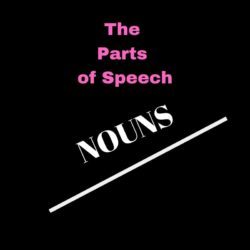Parts of Speech Series: Nouns, Part 1
 Nouns. Probably the first part of speech you ever heard about. And you no doubt remember the little ditty that went with nouns: “A noun is a person, place, or thing.” And if you had a very good teacher: “A noun is a person, place, thing, or idea.” And although we think of nouns as things we can see or touch, some — like ideas — we cannot.
Nouns. Probably the first part of speech you ever heard about. And you no doubt remember the little ditty that went with nouns: “A noun is a person, place, or thing.” And if you had a very good teacher: “A noun is a person, place, thing, or idea.” And although we think of nouns as things we can see or touch, some — like ideas — we cannot.
So nouns would appear to be pretty simple. But they do have some issues that we will discuss next week. For now, know that there are five categories of nouns, and every noun is in two or three of those categories. And these categories don’t include singular or plural, which is another feature of nouns.
Common nouns: A common noun is any noun that is not a specific person, place, thing, or idea and thus begins with a lowercase letter:
girl
school
car
religion
movie
idea
Proper nouns: A proper noun is a specific person, place, thing, or idea and is capitalized:
Alice
MacDonald Elementary School
Honda
Hinduism
Star Wars
Theory of Relativity
Concrete nouns: Concrete nouns are all the nouns that you can see or hear or feel or smell or taste. So even air is concrete since you can feel it. In the examples above 1,2,3, and 5 are concrete.
Abstract nouns:Abstract nouns are the ones you cannot sense. You can read a book on Hinduism or see a person who is Hindu, but you cannot see Hinduism. Examples 4 and 6 above are abstract.
So each noun is either common or proper — and also either concrete or abstract.
Common Concrete – table
Proper Concrete – Golden Gate Bridge (and yup, nouns can have more than one word, particularly proper nouns)
Common Abstract: thought
Proper Abstract: Judaism
Collective Nouns: Collective nouns are usually common and represent a group (which itself is a collective noun) even in the singular. However, collective nouns can be singular or plural. Here are some collective nouns:
band/bands (musical ones)
audience/audiences
cast/casts (in a play)
flock/flocks
orchestra/orchestras
Regular old plurals are not collective nouns. For example, people is a plain old plural, the singular of which is person. It is not collective.
Cases: Cases are forms of words. Latin has five cases. If you have ever studied Latin, you might remember that you use a different form of a noun depending upon whether it is a subject, an object, possessive, etc. Other languages have seven or eight cases. English has only three, and only pronouns have different forms for the three cases. Nouns have a different form only for possessive. (Plural is not a case.)
One More Thing About Nouns: Just because a word is a noun doesn’t mean it cannot also be another part of speech, or another two parts of speech, or three.
All the parts of speech were described in this recent post.
Many nouns are also adjectives:
Thanksgiving (noun)/Thanksgiving dinner (adjective)
summer (noun)/ summer vacation (adjective)
apple (noun)/apple pie (adjective)
Many nouns are also verbs:
He gave me a look. (noun)
He looked at me. (verb)
I made a plan. (noun)
I will plan a vacation. (verb)
Some nouns are verbs that have nothing to do with the noun:
I saw you. (verb)
He used a saw to cut the wood. (noun)
Some nouns are other parts of speech.
Well is an interesting word:
Timmy fell into the well. (noun)
Are you feeling well? (adverb)
Well, I never saw you there! (interjection)
NEXT WEEK: Some issues with nouns:
plurals
possessives
agreement with collectives
capitalization
hyphenation
No, I haven’t sold my house and moved to Florida yet. Still sitting here . . .



